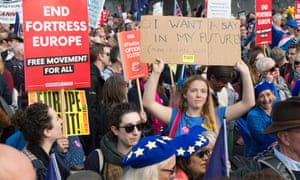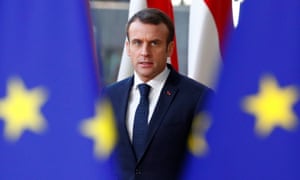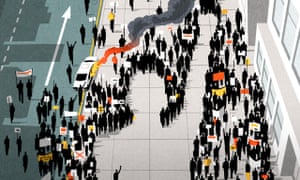
To what extent do we decide? We tell ourselves we choose our own life course, but is this ever true? If you or I had lived 500 years ago, our worldview, and the decisions we made as a result, would have been utterly different. Our minds are shaped by our social environment, in particular the belief systems projected by those in power: monarchs, aristocrats and theologians then; corporations, billionaires and the media today.
Humans, the supremely social mammals, are ethical and intellectual sponges. We unconsciously absorb, for good or ill, the influences that surround us. Indeed, the very notion that we might form our own minds is a received idea that would have been quite alien to most people five centuries ago. This is not to suggest we have no capacity for independent thought. But to exercise it, we must – consciously and with great effort – swim against the social current that sweeps us along, mostly without our knowledge.
Humans, the supremely social mammals, are ethical and intellectual sponges. We unconsciously absorb, for good or ill, the influences that surround us. Indeed, the very notion that we might form our own minds is a received idea that would have been quite alien to most people five centuries ago. This is not to suggest we have no capacity for independent thought. But to exercise it, we must – consciously and with great effort – swim against the social current that sweeps us along, mostly without our knowledge.
----Also Watch
The Day The Universe Changed
-----
Surely, though, even if we are broadly shaped by the social environment, we control the small decisions we make? Sometimes. Perhaps. But here, too, we are subject to constant influence, some of which we see, much of which we don’t. And there is one major industry that seeks to decide on our behalf. Its techniques get more sophisticated every year, drawing on the latest findings in neuroscience and psychology. It is called advertising.
Every month, new books on the subject are published with titles like The Persuasion Code: How Neuromarketing Can Help You Persuade Anyone, Anywhere, Anytime. While many are doubtless overhyped, they describe a discipline that is rapidly closing in on our minds, making independent thought ever harder. More sophisticated advertising meshes with digital technologies designed to eliminate agency.
Earlier this year, the child psychologist Richard Freed explained how new psychological research has been used to develop social media, computer games and phones with genuinely addictive qualities. He quoted a technologist who boasts, with apparent justification: “We have the ability to twiddle some knobs in a machine learning dashboard we build, and around the world hundreds of thousands of people are going to quietly change their behaviour in ways that, unbeknownst to them, feel second-nature but are really by design.”
The purpose of this brain hacking is to create more effective platforms for advertising. But the effort is wasted if we retain our ability to resist it. Facebook, according to a leaked report, carried out research – shared with an advertiser – to determine when teenagers using its network feel insecure, worthless or stressed. These appear to be the optimum moments for hitting them with a micro-targeted promotion. Facebook denied that it offered “tools to target people based on their emotional state”.
We can expect commercial enterprises to attempt whatever lawful ruses they can pull off. It is up to society, represented by government, to stop them, through the kind of regulation that has so far been lacking. But what puzzles and disgusts me even more than this failure is the willingness of universities to host research that helps advertisers hack our minds. The Enlightenment ideal, which all universities claim to endorse, is that everyone should think for themselves. So why do they run departments in which researchers explore new means of blocking this capacity?

‘Facebook, according to a leaked report, developed tools to determine when teenagers using its network feel insecure, worthless or stressed.’ Photograph: Alamy Stock Photo
I ask because, while considering the frenzy of consumerism that rises beyond its usual planet-trashing levels at this time of year, I recently stumbled across a paper that astonished me. It was written by academics at public universities in the Netherlands and the US. Their purpose seemed to me starkly at odds with the public interest. They sought to identify “the different ways in which consumers resist advertising, and the tactics that can be used to counter or avoid such resistance”.
Among the “neutralising” techniques it highlighted were “disguising the persuasive intent of the message”; distracting our attention by using confusing phrases that make it harder to focus on the advertiser’s intentions; and “using cognitive depletion as a tactic for reducing consumers’ ability to contest messages”. This means hitting us with enough advertisements to exhaust our mental resources, breaking down our capacity to think.
Intrigued, I started looking for other academic papers on the same theme, and found an entire literature. There were articles on every imaginable aspect of resistance, and helpful tips on overcoming it. For example, I came across a paper that counsels advertisers on how to rebuild public trust when the celebrity they work with gets into trouble. Rather than dumping this lucrative asset, the researchers advised that the best means to enhance “the authentic persuasive appeal of a celebrity endorser” whose standing has slipped is to get them to display “a Duchenne smile”, otherwise known as “a genuine smile”. It precisely anatomised such smiles, showed how to spot them, and discussed the “construction” of sincerity and “genuineness”: a magnificent exercise in inauthentic authenticity.

Facebook told advertisers it can identify teens feeling 'insecure' and 'worthless'
Another paper considered how to persuade sceptical people to accept a company’s corporate social responsibility claims, especially when these claims conflict with the company’s overall objectives. (An obvious example is ExxonMobil’s attempts to convince people that it is environmentally responsible, because it is researching algal fuels that could one day reduce CO2 – even as it continues to pump millions of barrels of fossil oil a day). I hoped the paper would recommend that the best means of persuading people is for a company to change its practices. Instead, the authors’ research showed how images and statements could be cleverly combined to “minimise stakeholder scepticism”.
A further paper discussed advertisements that work by stimulating Fomo – fear of missing out. It noted that such ads work through “controlled motivation”, which is “anathema to wellbeing”. Fomo ads, the paper explained, tend to cause significant discomfort to those who notice them. It then went on to show how an improved understanding of people’s responses “provides the opportunity to enhance the effectiveness of Fomo as a purchase trigger”. One tactic it proposed is to keep stimulating the fear of missing out, during and after the decision to buy. This, it suggested, will make people more susceptible to further ads on the same lines.
Yes, I know: I work in an industry that receives most of its income from advertising, so I am complicit in this too. But so are we all. Advertising – with its destructive impacts on the living planet, our peace of mind and our free will – sits at the heart of our growth-based economy. This gives us all the more reason to challenge it. Among the places in which the challenge should begin are universities, and the academic societies that are supposed to set and uphold ethical standards. If they cannot swim against the currents of constructed desire and constructed thought, who can?




